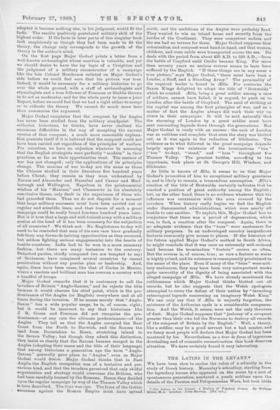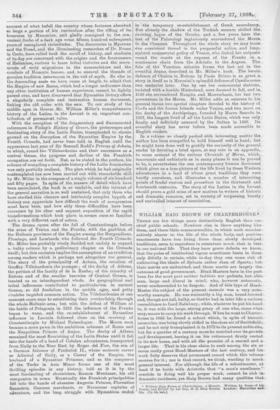THE LATINS IN THE LEVANT.*
E have been slow to realise the value of o mtinuity in the study of Greek history. Macaulay's schoolboy, starting from the legendary heroes who appeared on the scene by a sort of spontaneous generation, nurtured a youth sublime upon. the details of the Persian and Peloponnesian Wars, but took little —
. , . .
• * The Latine in he I Levant , Dietary of Prankish Grum By William Miller, M.A. LOodon : John Murray. Pls. not.]
account of what befell the country whose fortunes absorbed so large a portion of his curriculum after the rifling of its treasures by Mummius, and gladly consigned to the con- venient limbo of a dark age some fifteen hundred subsequent years of unexplored vicissitudes. The discoveries in Mycenae and the Troad, and the illuminating researches of Dr. Evans in Crete, have rolled back the scroll of history, and students of to-day are concerned with the origins and the forerunners of Hellenism, curious to trace tribal victories and the move- ments of early migrations in the nomenclature and the combats of Homeric heroes, and to unravel the threads of genuine tradition interwoven in the veil of myth. So also in the descending scale we have come at length to admit that the Empire of new Rome, which had a longer endurance than any other institution of human experience, cannot be lightly passed over, and have discovered that Byzantine history offers a singularly complete and instructive human document, linking the old order with the new. To our study of the middle ages in Greece Mr. William Miller's comprehensive history of the Latins in the Levant is an important con- tribution of permanent value.
With the exception of the fragmentary and disconnected references in Finlay'e Hislory of Greece, the picturesque and fascinating story of the Latin States, transplanted to classic ground on the disruption of the Byzantine Empire by the Fourth Crusade, had never been told in English until the appearance last year of Sir Rennell Rodd's Princes of Achaia, in which, round the Villehardouins and their successors as a central theme, the progress and decline of the Frankish occupation are set forth. But, as be stated in the preface, his scheme of compiling a complete history of the Latin domination was only partially realised. The plan which he had originally contemplated has now been carried out with remarkable skill by Mr. Miller in the compass of a single volume of six hundred and fifty pages. In spite of the masses, of detail which have been assimilated, the book is so readable, and the interest of the general narrative is so well sustained, that only those who have studied this obscure and intricately complex bypath of history can appreciate how difficult the work of compression must have been, and how ably these difficulties have been overcome by his clear and sequent exposition of the rapid transformations which took place in scenes once so familiar with a very different cast of actors.
The drama opens after the fall of Constantinople before the arms of Venice and the Franks, with the partition of the Hellenic provinces of the Empire among the Burgundians, Flemings, and Lombards who followed the Fourth Crusade. Mr. Miller has probably wisely decided not unduly to expand a bulky volume by a preliminary chapter on the Crusade itself ; but this omission implies the assumption of an erudition among readers which is perhaps not altogether too general. The story of the principality of Achaia, the creation of Geoffry Villehardouin the younger ; of the duchy of Athens, the portion of the family of de la Roche ; of the triarchy of Euboea and of the smaller baronies of Central Greece, is treated as an interdependent whole. As geographical and tribal influences contributed to particularism in ancient Greece, so did feudalism in the middle ages, and petty rivalries impeded common action. The Villehardouins at one moment came near to establishing their overlordship through the whole Hellenic area; but with the defeat of William at the battle of Pelagonia in 1259 the influence of the Franks began to wane, mad the re-establishment of Byzantine influence in Laconia followed close on the recovery of Constantinople by Michael Palaeologus. The Morea soon became a mere pawn in the ambitious schemes of Rome and the Neapolitan Princes of Anjou. The duchy of Athens remained the most flourishing of the Latin States until it fell into the bands of a band of Catalan adventurers, transported from Sicily to the Near East by Roger del Fior, the son of a German falconer of Frederick II., whose meteoric career as Admiral of Sicily, as a Caesar of the Empire, the husband of a Byzantine Princess, and as the conqueror of the Turks in Asia Minor forms one of the most thrilling episodes in any history, told as it is by the most fascinating of chroniclers, Ramon Muntaner, his old companion in arms. Eventually the Frankish principalities fell into the bands of absentee Angevin Princes, Florentine financiers, Genoese merchants, or Navarrese captains of adventure, and the long struggle with Byzantium ended
in the temporary re-establishment of Greek ascendency. But already the shadow a the Turkish menace chilled the reviving hepes of the Greeks, and a few years later the last of the Palaeologi ingloriously surrendered the Mores to the Crescent. Throughout the whole story we may trace one consistent thread in the purposeful action and long- sighted commercial policy of Venice, who linked her outposts round the coasts at the expense of the Franks in a. continuous chain from the Adriatic to the Aegean. The fate of the Venetian colonies forme the last act in the eventful drama described in Mr. Miller's book. The heroic ,defence of ChalCie in Euboea by Paolo Erizzo is as great a story in itself as is Morosiui's splendid defence of Candia some two centuries later. One by one her commercial stations, isolated with a hostile Hinterland, were doomed to fall, and in, 1540 she surrendered Nauplia and Monembasia, her last two possessions in the Mores. Mr. Miller adds as annexes to his general theme two special chapters devoted to the history of. Corfu and the Ionian Islands under Venice, and two more on the duchy of the Archipelago, founded by Marco Sanudo in 1207, the longest lived of all the Latin States, which was only finally and definitely annexed by the Sultan in 1566. Its eventful story has never before been made accessible to English readers.
In a volume so closely packed with interesting matter the author has been compelled to hold himself well in hand; but be might have done well to gratify the curiosity of the general reader by devoting a brief space, at any rate in an appendix, to some account of the curious Chronicle of Morea, which, inaccurate and unhistoric as in many places it can be proved to be, is nevertheless the one contemporary human document which gives us a true picture of the life lived by these Western adventurers in a land of whose great traditions they were hardly .conscious, and illustrates a number of interesting points of feudal custom and procedure in the thirteenth and fourteenth centuries. The story of the Latins in the Levant should prove a gold mine of new motives to writers of historic and dramatic romance, set in scenery of surpassing beauty and unrivalled interest of association.







































 Previous page
Previous page